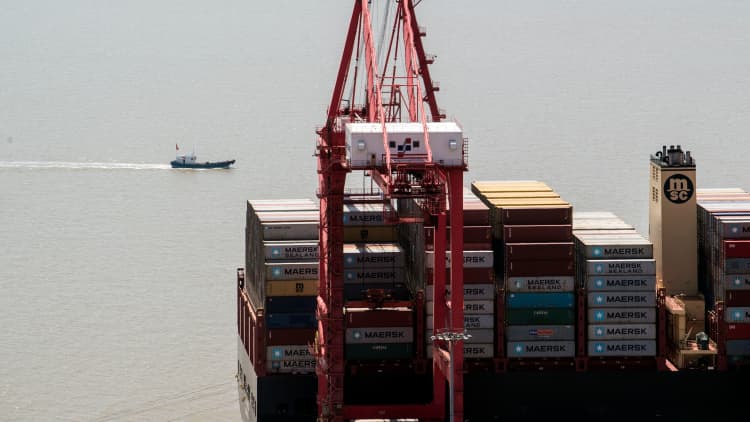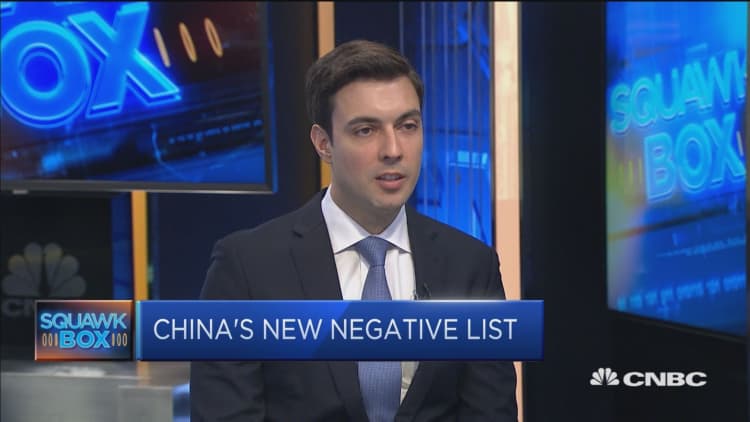
China's top leaders on Tuesday pledged economic stability just as data from the world's second-largest economy suggested that the country was starting to feel a pinch from U.S. tariffs.
In a statement carried by China's state media after a meeting of the Politburo, a top decision-making body of the ruling Communist Party, Beijing said it will take targeted measures to solve issues in the economy.
The Chinese economy is facing "some new problems and new challenges," said the statement carried by state-run Xinhua news agency.
"There are obvious changes in the external environment," the statement added. It did not specifically mention China's ongoing trade war with the U.S.
"We must do a good job in stabilizing employment, finance, foreign trade and investment, and expectations," the statement added.
Analysts said the Politburo's communication suggests that Beijing will be fine-tuning its economic policies. Some form of easing is expected.
"China's top policy makers are clearly concerned about two issues: the sharp slowdown of credit growth and the uncertainty due to the trade war. As such, they called for more proactive fiscal policy and infrastructure spending," Macquarie economists Larry Hu and Irene Wu wrote in a note.
However, Beijing will continue to keep a lid on debt, as the statement reaffirmed, the economists added. That could change if the employment situation in the country worsens.
"The statement also offers some clues as it mentioned stabilizing employment twice. In other words, if the unemployment problem becomes severe, a policy U-turn could happen from deleveraging to boosting growth. Clearly we are not there yet," the Macquarie economists added.
Beijing's economic growth target for 2018 is around 6.5 percent.
This year, China posted second-quarter GDP growth of 6.7 percent from a year ago, slightly lower than 6.8 percent in the first quarter of 2018.
Even before the ongoing trade dispute with Washington, the Chinese government was already managing a slowdown in its economy as Beijing cracked down on high debt levels and heavily polluting industries.

Tuesday's notice from the Chinese government came as economic indicators from the country showed U.S. tariffs were starting to bite.
In July, the Caixin/Markit Purchasing Manager's Index — a closely watched gauge of China's economic activity — hit an eight-month low as new export orders fell at the steepest pace in more than two years, the two organizations said.
The data pointed to "some negative impact of the first tranche of U.S. tariffs that came into effect last month," said Julian Evans-Pritchard, Capital Economics' senior China economist.
He said he expects further weakness ahead.
"We see increasing headwinds to the manufacturing sector from the recent slowdown in credit growth. U.S. tariffs will also be a drag, weighing on investment and foreign demand," added Evans-Pritchard.
Results of the private Caixin/Markit survey showed the same trend as China's growth in manufacturing activity slowed in July from June. China's official PMI gauge focuses on large companies and state-owned enterprises, while the reading by Caixin and IHS Markit focuses on small and medium-sized enterprises.
American took effect on July 6. with duties of its own on the same value of American goods. President Donald Trump's administration countered that it is preparing possible tariffs on more in Chinese goods. In July, the president said he was willing to slap tariffs on every Chinese-made product shipped to the U.S.
There are fears that the trade spat between the world's two largest economies could hit markets and even the global economy.
—Reuters contributed to this report.

